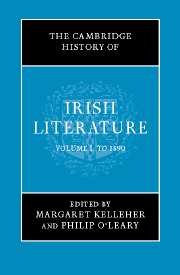Book contents
- Frontmatter
- Introduction
- 1 The literature of medieval Ireland to c. 800: St Patrick to the Vikings
- 2 The literature of medieval Ireland, 800–1200: from the Vikings to the Normans
- 3 The literature of later medieval Ireland, 1200–1600: from the Normans to the Tudors
- 4 Literature in English, 1550–1690: from the Elizabethan settlement to the Battle of the Boyne
- 5 Literature in Irish, c.1550–1690: from the Elizabethan settlement to the Battle of the Boyne
- 6 Prose in English, 1690–1800: from the Williamite wars to the Act of Union
- 7 Poetry in English, 1690–1800: from the Williamite wars to the Act of Union
- 8 Literature in Irish, 1690–1800: from the Williamite wars to the Act of Union
- 9 Theatre in Ireland, 1690–1800: from the Williamite wars to the Act of Union
- 10 Irish Romanticism, 1800–1830
- 11 Prose writing and drama in English, 1830–1890: from Catholic emancipation to the fall of Parnell
- 12 Poetry in English, 1830–1890: from Catholic emancipation to the fall of Parnell
- 13 Literature in Irish, 1800–1890: from the Act of Union to the Gaelic League
- 14 Historical writings, 1690–1890
- 15 Literature and the oral tradition
- Guide to major subject areas
- Index
- References
13 - Literature in Irish, 1800–1890: from the Act of Union to the Gaelic League
Published online by Cambridge University Press: 28 March 2008
- Frontmatter
- Introduction
- 1 The literature of medieval Ireland to c. 800: St Patrick to the Vikings
- 2 The literature of medieval Ireland, 800–1200: from the Vikings to the Normans
- 3 The literature of later medieval Ireland, 1200–1600: from the Normans to the Tudors
- 4 Literature in English, 1550–1690: from the Elizabethan settlement to the Battle of the Boyne
- 5 Literature in Irish, c.1550–1690: from the Elizabethan settlement to the Battle of the Boyne
- 6 Prose in English, 1690–1800: from the Williamite wars to the Act of Union
- 7 Poetry in English, 1690–1800: from the Williamite wars to the Act of Union
- 8 Literature in Irish, 1690–1800: from the Williamite wars to the Act of Union
- 9 Theatre in Ireland, 1690–1800: from the Williamite wars to the Act of Union
- 10 Irish Romanticism, 1800–1830
- 11 Prose writing and drama in English, 1830–1890: from Catholic emancipation to the fall of Parnell
- 12 Poetry in English, 1830–1890: from Catholic emancipation to the fall of Parnell
- 13 Literature in Irish, 1800–1890: from the Act of Union to the Gaelic League
- 14 Historical writings, 1690–1890
- 15 Literature and the oral tradition
- Guide to major subject areas
- Index
- References
Summary
Remarking on his own sense of discontinuity and uprootedness as a writer of English, resulting from what he calls the great linguistic rift of the shift from Irish to English, Thomas Kinsella refers to ‘the silence of the nineteenth century’. Joep Leerssen, in his widely acclaimed Field Day monograph Remembrance and Imagination, asserts from the outset that ‘the native tradition in the nineteenth century is almost silent, having been pauperised into virtual illiteracy’. While the use of words like ‘almost’ and ‘virtual’ can be said to leave an ideological escape clause, Seamus Deane leaves his readers in no doubt when he definitively states in his Short History of Irish Literature that Irish ‘was well and truly dead by the end of the eighteenth century’. The direct result of such a claim is of course that, as literature in Irish no longer exists, it is intellectually acceptable to redefine the very notion and nature of ‘Irish literature’. Thus, in his study of ‘Irish National Character 1790–1900’, Deane draws solely on literature in English and claims that ‘the idea of an Irish national character took shape in response to the earlier and aggressive English (or British) definition’. Irish literature of the period as a result becomes a progression from Edmund Burke through the first Celtic Revival and the antiquarian movement, followed by the novels of Maria Edgeworth, the stories of William Carleton, the writings of Samuel Ferguson and Standish O’Grady, and finishes up with W. B. Yeats. In the same vein, Norman Vance, in the introductory chapter of his Irish Literature since 1800, gives a mere eleven lines to the nineteenth century in a twelve-page background section on ‘The Irish Language Tradition’ and refers only to the ‘rescue activity’ of scholars and translators.
- Type
- Chapter
- Information
- The Cambridge History of Irish Literature , pp. 544 - 598Publisher: Cambridge University PressPrint publication year: 2006
References
- 2
- Cited by

